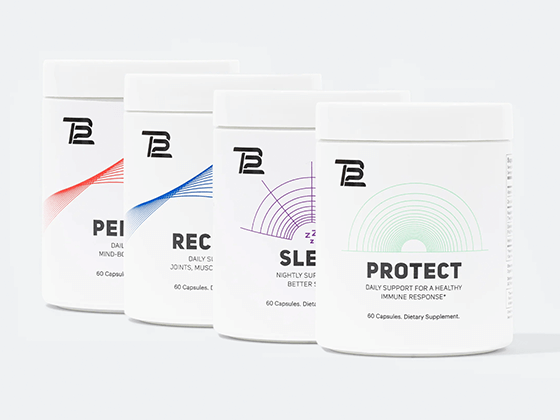Your body is one integrated whole, which is easy to see when you look at the relationship between the body and the brain.
Your brain, which ties into your entire body through the central nervous system, is affected by everything you do — the food you eat, the supplements you take, how much water you drink, your sleep schedule, and your daily exercise routine. And by optimizing each of these inputs, it’s possible to get your brain into the best shape of your life.
How Supplements Affect Your Brain
Vitamins and minerals: what happens without them? Your body and brain require certain essential vitamins and minerals in order to perform essential tasks. Without these essential nutrients, you may develop serious diseases. In addition, certain vitamins and minerals have specific effects on how your brain functions.
For example, thiamine (Vitamin B1), riboflavin (B2), niacin (B3), and folates are said to improve abstract thought, and vitamin C improves performance in visuospatial tasks (think hand-eye coordination).
Over the long term, the content of your diet affects the health of your brain. There’s evidence to suggest that a diet rich in berries, nuts, omega-3 fatty acids and curcumin can help decelerate the natural decline in cognitive function that comes with aging.
On the opposite end, diets high in refined sugars or other “empty” calories can stress your body and impair cognitive function. It’s easy to miss certain vitamins and minerals that are important for supporting good cognitive health. We recommend taking an appropriate supplement to help optimize your diet.
How Exercise Affects Your Brain
Exercise has immediate, short-term, and long-term benefits for your brain. In the short term, exercise can boost your mood and reduce stress, anxiety, and depression. In terms of cognitive function, exercise increases decision speed (without impairing judgment) and boosts focus— both of which are important in sports and in life. Over the long term, regular exercise has actually been shown to increase the size of the hippocampus, which is responsible for spatial memory.
As we age, the hippocampus typically shrinks, but research has shown that this natural decline can actually be reversed if you stay on your feet. Exercise protects against age-related decline in other parts of the brain as well, which means it’s an essential part of doing what you love better and for longer.
Keep Your Brain Fit with the Big Five
You can use food, supplements, water, sleep, and exercise to keep your mind sharp day-to-day and help to protect yourself against many of the natural cognitive declines that come with aging. By recharging your brain, you take charge of your life.
How Nutrition Affects Your Brain
Like the rest of your organs, your brain is a self-repairing structure. An intricate organic maze of cells, it constantly grows and constantly rebuilds. In order to keep up with the demands of your life, it needs a steady supply of raw materials, which it gets from the food you eat.
When it comes to the effect of food on your brain, three things are most important:
- Getting enough vitamins and minerals
- Getting the right amount of calories (not too much, not too little)
- Getting those calories with the right cadence
Slipping up on any of these can hurt your cognitive performance. Let’s dive into the details.
Calories at a regular rate: the ill effects of skipping lunch.
If you’ve ever skipped lunch, you understand that going several hours without food can affect your ability to do what you need to do. It’s harder to focus, think, and plan, and you may struggle to make decisions. It’s normal for cognitive function to drop if you go too long without a meal.
For example, one study looked at how fasting during the day affected people observing Ramadan. During Ramadan, people typically have one meal before dawn and fast until sundown — which creates a big caloric gap in the middle of the day.
The study found two things: Right after breakfast, subjects showed a significant increase in psychomotor function (i.e., brain to muscles) and visual processing. Right before dinner — that is, following at least 8 hours of fasting — subjects showed a significant drop in performance on learning and memory tasks.
Another study looked at the effects of fasting on reaction times after two hard sprints. The results were similar: the subjects who fasted had significantly slower reaction times than the ones who didn’t.
Depriving your body of food not only makes you feel sluggish and lightheaded — which you already know — but it literally makes your brain slower.
Moderation in all things: getting the right amount of calories.
One of our core principles at TB12 is moderation, and this applies to the way caloric intake affects your brain. While cutting out too many calories can have serious effects on short-term memory, planning, and decision-making (as seen in patients with eating disorders), the brain actually performs well with a slight reduction in caloric intake.
In fact, research shows that the best way to maintain cognitive performance through food is through moderate calorie restriction— eating until you’re about 75 percent full. This is what Tom Brady does, and evidence from scientific studies supports it.
Long-term caloric restriction promises a host of benefits for your body (like weight loss and a lower risk of heart diseases), but it can also reduce feelings of depression and hunger without hurting your cognitive performance.
How Hydration Affects Your Brain
Your brain is 75 percent water, so when it doesn’t get enough, it really feels it. The most important effect of dehydration on your cognitive performance is the simplest one: it makes you feel awful. And if you feel bad, you’re not going to play at the top of your game.
This effect of dehydration is well-documented — but it’s also easy to understand because we’ve all been there. In addition to making you feel subjectively worse, dehydration has specific effects on your brain function. Dehydration has been found to impair hand-eye coordination, short-term memory, attention, alertness, and concentration — all of which you need to do what you love.
On the flip side, adding water back into your system has positive effects. For example, you can boost brain activity instantly by drinking a glass of water, even if you’re not thirsty.
How Sleep Affects Your Brain
The strongest conclusions that scientists can make about sleep and the brain come from studies of sleep deprivation, which evaluate test subjects’ cognitive performance (on a variety of tasks) after the subjects have been kept awake for a certain amount of time. These studies have found that sleep deprivation affects your brain in serious ways.
Sleep deprivation has several effects. First, it makes it harder for you to learn new skills. Specifically, it throws a wrench into the hippocampus, the part of the brain responsible for short-term, long-term, and spatial memory (your memory of where things are and how to get to them). For this reason, long-term sleep deprivation can actually lead to psychological disorders and permanent cognitive problems.
In addition to this, sleep deprivation decreases alertness, increases reaction time, impairs decision making, lowers mood, and causes confusion. All of these effects make sleep deprivation one of an athlete’s worst enemies.
Improve your sleep by respecting your circadian rhythm.
The most important thing you can do to improve your sleep is to respect your circadian rhythm, which we discuss at length in The Circadian Rhythm: What Is It And Why Is It Important. For the most part, this means sticking to a consistent daily routine.
Follow these tips to optimize your rhythm, performance, and overall health.
- Stick to one time zone.
- Do your best to wake up and go to bed at the same time every day, including weekends.
- Maximize blue light in the morning and limit blue light in the evening. Blue light resets your body’s master clock to think it’s daytime, and even a little blue light at the wrong time of day can throw off your body’s internal rhythm.
- Keep all your meals in a 10-hour window during the day. This is called Time-Restricted Eating, and it has been shown to improve sleep quality.
- Within that window, eat your meals at the same time each day. Your gut clock, which runs on an independent schedule, expects food roughly at the same times every day.
- Respect a 3-hour buffer zone between dinner and bedtime to give your digestive organs time to realize their last meal is done and go into “sleep mode.”







